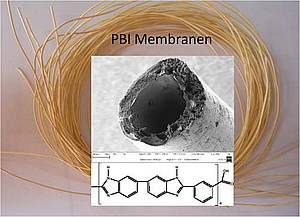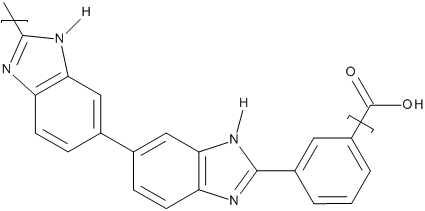Polymer membranes
Production of solvent resistant membranes
Due to raising energy costs the use of membranes in seperation processes has become an interesting alternative to thermal separation processes. The use of membranes is well-established in water treatment and is gaining market shares in the field of organic solvents.
A disadvantage and a reason why membranes are not commonly used in the field of organic solvents is their missing universal resistance to organic solvents. Although a large range of solvent resistant polymer materials is available, the requirements for solvent resistant membrane materials is due to their high porosity at the least equal to the bulk material.
The synthesis of suitable polymers and the development and characterization of membranes is the subject of this research project.
Polybenzimidazole derivatives
Polybenzimidazole (PBI) is a high performance polymer with an extended application temperature range. With a dimensional stability ranging from -196 °C to +345 °C and an extraordinary resistance to chemicals and water vapour it can be used outside the operating conditions of classical polymers. PBI can be spun into fibers which are used for fire protective clothing. Fibers spun from PBI do not shrink or embrittle even after being exposed to flames, which is an advantage over amaride fibers.
PBIs are synthesised from an aromatic tetramine and an aromatic bifunctional carboxylic acid or its ester. Isophthalic acid polybenzimidazole celazole is a commercially available product. However PBIs are basically producible with any aromatic bifunctional carboxylic acid, so the technical properties of this class of high performance polymers can be significantly extended.
With increasing research efforts on fuel cells there is an increasing demand for highly resistant polymers. Fuel cell membranes made from PBI represent an alternative for state of the art nafion membranes. Especially the possibility of using PBI membranes at low atmospheric moisture levels and temperatures above 100 °C makes them attractive for fuel cell applications.
The price paid for the excellent chemical resistance of PBI is a poor solubility in classical solvents and a high brittleness. The ambition of this project is the synthesis and characterization of custom tailored polybenzimidazoles for different fields of application.



